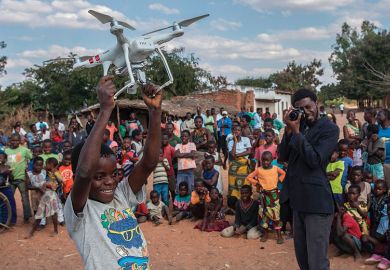Africa’s demographic boom is both a blessing and a problem. With 60 per cent of the continent’s population under the age of 25, its human capital potential is vast. But educational systems are failing to realise that potential – and it seems clear that it cannot be realised by the traditional models alone.
The most recent African Development Bank statistics illustrate that more than half (54 per cent) of the continent’s 54 nations are still failing to meet the United Nations’ recommended minimum spending on education of 4 per cent of GDP and 15 per cent of overall government spending.
Time is running out. The fourth industrial revolution of artificial intelligence and robotics is already upon us. If Africa wants to be a part of it, transforming itself into an innovative knowledge economy, stakeholders must come together with policymakers to encourage the development of a more industry-focused, pro-innovation higher education ecosystem that places entrepreneurship and digital knowledge at the heart of its curricula.
The traditional classroom, which focuses on static, oral teaching and knowledge retention, is obsolete. The future demands a lab-based, tech-rich, collaborative learning environment that simulates real-world situations and is led by a coach rather than a teacher. This form of peer-to-peer, hands-on learning is what is needed to build the necessary soft skills and entrepreneurial mindsets that are increasingly required by employers.
To be fair, this innovation agenda is already starting to be implemented. Ghana’s Ashesi University launched its entrepreneurship support programme, the Ashesi Venture Incubator, in 2019. This not-for-profit initiative is a one-year incubation experience for recent graduates and alumni of the university, part of a USAID-funded initiative co-led by Ashesi and the Massachusetts Institute of Technology’s D-Lab, which focuses on addressing global development challenges.
Ghana is also home to the NEXTi2i Project (New Entrepreneurs Xchange for Transformation: Idea to Impact), which was launched in 2018, in response to USAID’s Accelerating Local Potential programme.
But we need much more. A crucial part of the required transformation is coding. Skill in coding underlies the fourth industrial revolution and it will arguably be the most important language to learn in the coming century. Understanding coding allows graduates to develop a computational approach to problems and formulate new solutions in response to changes in the digital economy. This adaptability is precisely what industries need today and what higher education institutions should be concerned with.
As far back as 2012, the Harvard Business Review referred to data science as the “sexiest job of the 21st century”. Data science is certainly an increasingly popular choice for undergraduates, and some key players in the technology space have joined initiatives to boost the digital skills and employability of African youth. Microsoft, for instance, has partnered with the African Development Bank to run a Coding for Employment programme, which aims to create 25 million jobs by 2025 and to equip 50 million young Africans with competitive skills.
But universities themselves should also put their shoulders to the wheel. Honoris United Universities – the first and largest pan-African network of private higher educational institutions – is pioneering a new approach that both delivers education and bridges the gap into employment. Our universities have developed cutting-edge learning environments that confront students with complex, real-world scenarios via virtual reality and scenario- and model-based simulations. This skills- and project-based approach increases the cognitive agility of students and meets the fourth industrial revolution’s demand for critical thinking, communication, creativity, problem-solving, digital literacy and emotional intelligence.
We already know that African youth are geared towards innovation. Generation Z – those born in the mid to late 1990s and early 2000s – view the internet as a human right; this world we live in is the only one they have ever known. They are more than ready to leapfrog the legacy way of doing things and take their rightful place in the new digital economy.
They just need their universities to do the same – and fast.
Laura Kakon is chief growth and strategy officer at Honoris United Universities.
Register to continue
Why register?
- Registration is free and only takes a moment
- Once registered, you can read 3 articles a month
- Sign up for our newsletter
Subscribe
Or subscribe for unlimited access to:
- Unlimited access to news, views, insights & reviews
- Digital editions
- Digital access to THE’s university and college rankings analysis
Already registered or a current subscriber?





